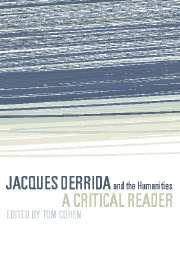Book contents
- Frontmatter
- Contents
- Preface
- Acknowledgements
- Biographical chronology
- Introduction: Derrida and the future of …
- Chapter 1 The future of the profession or the university without condition (thanks to the “Humanities,” what could take place tomorrow)
- Chapter 2 Derrida and literature
- Chapter 3 Derrida and gender: the other sexual difference
- Chapter 4 Derrida and aesthetics: Lemming (reframing the abyss)
- Chapter 5 Derrida and representation: mimesis, presentation, and representation
- Chapter 6 Derrida and philosophy: acts of engagement
- Chapter 7 Derrida and ethics: hospitable thought
- Chapter 8 Derrida and politics
- Chapter 9 Derrida and law: legitimate fictions
- Chapter 10 Derrida and technology: fidelity at the limits of deconstruction and the prosthesis of faith
- Chapter 11 Derrida and history: some questions Derrida pursues in his early writings
- Chapter 12 Derrida and psychoanalysis: desistantial psychoanalysis
- Glossary
- Index
- References
Chapter 11 - Derrida and history: some questions Derrida pursues in his early writings
Published online by Cambridge University Press: 22 September 2009
- Frontmatter
- Contents
- Preface
- Acknowledgements
- Biographical chronology
- Introduction: Derrida and the future of …
- Chapter 1 The future of the profession or the university without condition (thanks to the “Humanities,” what could take place tomorrow)
- Chapter 2 Derrida and literature
- Chapter 3 Derrida and gender: the other sexual difference
- Chapter 4 Derrida and aesthetics: Lemming (reframing the abyss)
- Chapter 5 Derrida and representation: mimesis, presentation, and representation
- Chapter 6 Derrida and philosophy: acts of engagement
- Chapter 7 Derrida and ethics: hospitable thought
- Chapter 8 Derrida and politics
- Chapter 9 Derrida and law: legitimate fictions
- Chapter 10 Derrida and technology: fidelity at the limits of deconstruction and the prosthesis of faith
- Chapter 11 Derrida and history: some questions Derrida pursues in his early writings
- Chapter 12 Derrida and psychoanalysis: desistantial psychoanalysis
- Glossary
- Index
- References
Summary
History entered into the domain of philosophical inquiry once philosophers had exhausted other responses to a question they cannot fail to pose: under what conditions does philosophical inquiry begin? Because one cannot know these conditions unless one is a philosopher and one cannot become a philosopher unless one is aware of these conditions, the question issues into an aporia. The aporia may be called “metaphilosophical,” since it is less concerned with specific philosophical questions than with the moments at which questions first become philosophical. If the conditions under which philosophical inquiry takes place are not supposed to remain a mysterious gift, and if philosophers are not supposed to reconcile themselves to the mystery at the inception of their questioning but are, instead, under an obligation to inquire into its enabling conditions, then these conditions must themselves be available for inquiry (in Greek, historein). The term history thus opens a way out of an otherwise intractable aporia: it allows philosophers to speak of the conditions that give rise to the questions they pose without having to invoke categories such as the ineffable or indescribable. As long as philosophers can appeal to history in response to the question “how does philosophical inquiry begin?” they need not repeat the traditional Platonic-Aristotelian answer: under the miraculous, mysterious, or in any case indescribable condition of “wonder” (thauma).
- Type
- Chapter
- Information
- Jacques Derrida and the HumanitiesA Critical Reader, pp. 271 - 295Publisher: Cambridge University PressPrint publication year: 2002



